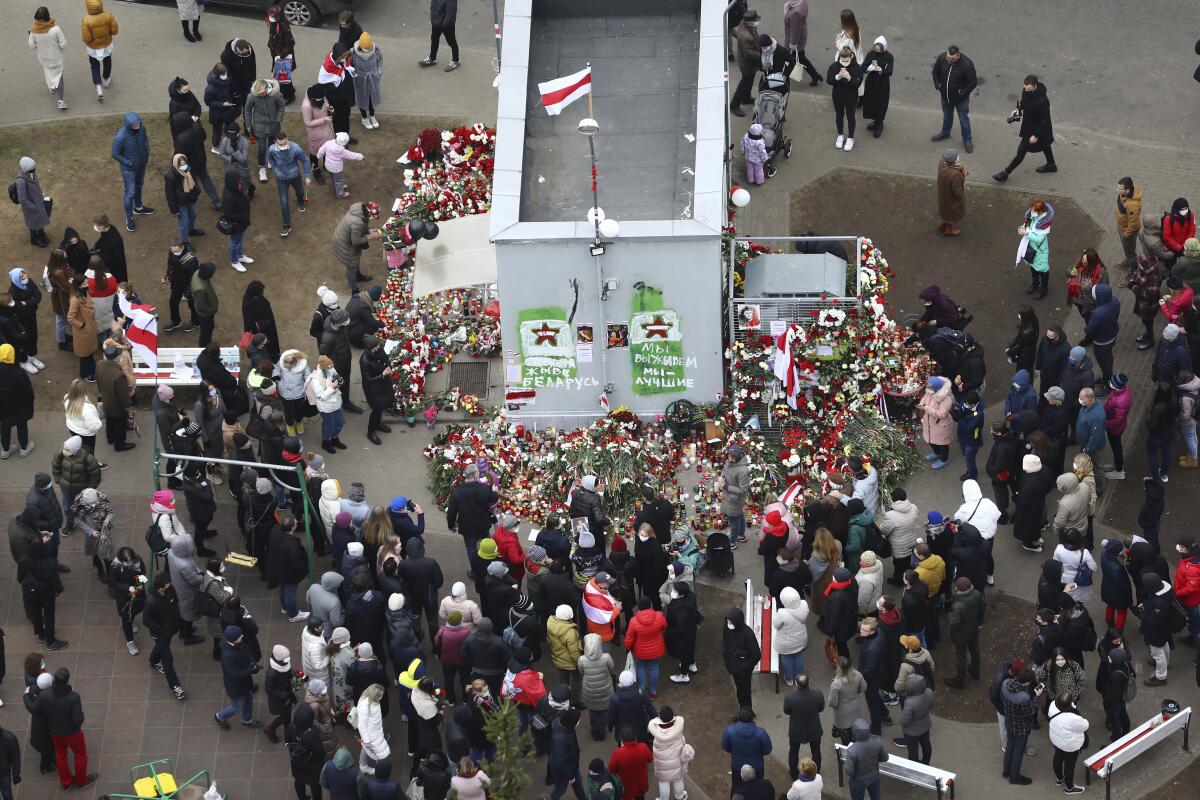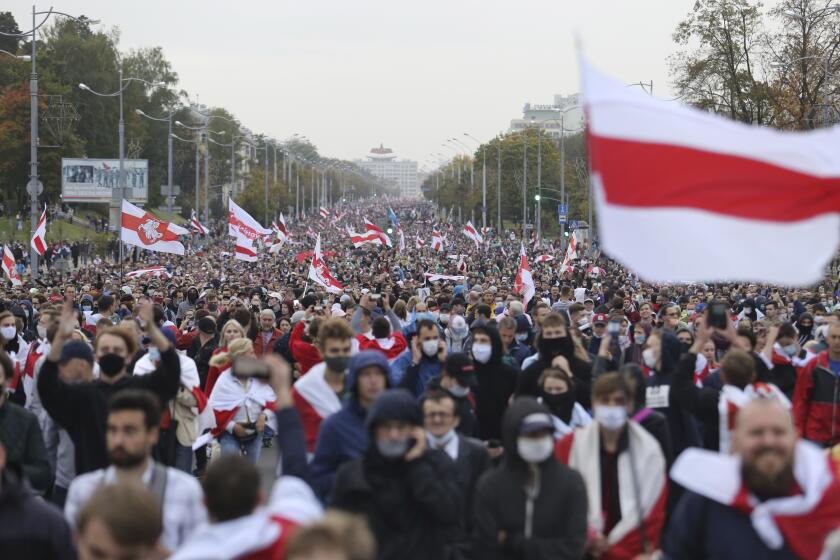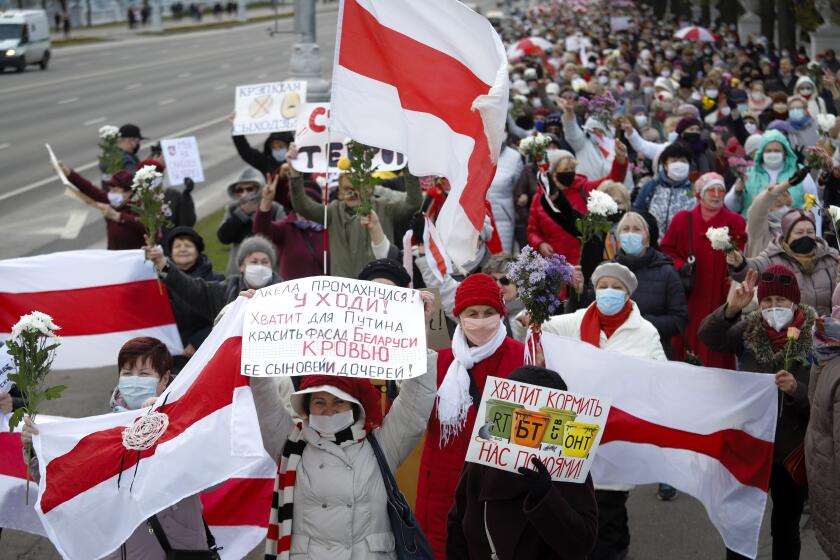Thousands flood streets in Belarus after opposition supporter’s death

- Share via
KYIV, Ukraine — Thousands of people rallied in Belarus on Friday following the death of a 31-year-old opposition supporter who died after he was reportedly beaten by security forces.
The man’s death Thursday came after more than three months of mass anti-government protests that were sparked by official election results giving authoritarian President Alexander Lukashenko a sixth term in office. Opposition leaders and some poll workers say the results were manipulated, and protesters have been calling for Lukashenko’s resignation.
More than 17,000 people have been detained — thousands of them brutally beaten — since the Aug. 9 presidential election, human rights advocates have reported.
Thousands of people carrying flowers and candles formed human chains in several Belarusian cities, including the capital, Minsk, to honor the late opposition supporter, Raman Bandarenka, who died at a Minsk hospital after several hours of surgery for serious injuries. Some of the banners that the demonstrators held said, “Stop killing us.”
Ales Bialiatski, the head of the Viasna human rights center, said that plainclothes men who went to a Minsk courtyard to remove red and white ribbons — a symbol of the protests in Belarus — detained Bandarenka in the courtyard Wednesday evening. They handed him over to police officers, who brutally beat Bandarenka inside a van, Bialiatski said in a statement.
“As a result, Raman sustained a severe head injury and in grave condition was brought to the police [station]. An ambulance wasn’t called for two more hours. The doctors were unable to save Raman Bandarenka’s life,” Bialiatski said, calling for a criminal investigation to hold those responsible for Bandarenka’s death accountable.
The government of Belarus’ authoritarian president, Alexander Lukashenko, claims he garnered nearly 80% of the vote Aug. 9. The European Council says that’s just not credible.
Belarusian authorities have confirmed that Bandarenka was brought to the hospital from a police station in Minsk but denied responsibility for his death. Police maintained that he was injured in a street fight. Belarus’ Investigative Committee said Bandarenka also displayed signs of “alcohol intoxication.” An inquiry has been launched.
Bandarenka’s death elicited outrage both in Belarus and abroad. The European Union condemned the violence.
“This is an outrageous and shameful result of the actions by the Belarusian authorities, who have not only directly and violently carried out repression of their own population, but also created an environment whereby such lawless, violent acts can take place,” Peter Stano, the EU’s spokesman for foreign affairs and security policy, said in a statement.
Stano accused Lukashenko’s government of “ignoring not only the fundamental rights and freedoms of the Belarusian people, but also disregarding their lives.”
Thousands of retirees rally in the Belarusian capital of Minsk to demand the resignation of the country’s longtime authoritarian president.
Opposition leader Sviatlana Tsikhanouskaya, who challenged Lukashenko in August’s presidential election and received the second-most votes, called Bandarenka “a hero” and “an innocent victim of an inhumane system.”
“The man was killed because he wanted to live in a free country,” Tsikhanouskaya, who is currently in exile in Lithuania, said in a video statement Friday. “But we will never obey those who are ready to kill us.”
In an interview with state media Friday, Lukashenko did not mention Bandarenka’s death and renewed his stance that the ongoing unrest was illegitimate. He likened it to the so-called “color revolutions” that overthrew leaders in other post-Soviet countries.
“We unequivocally assess the events taking place in the country after the elections as an attempt at an unconstitutional coup on the patterns of, as they say now, color revolutions,” he said. “Any color revolution makes the state weaker and the people poorer.”
Breaking News
Get breaking news, investigations, analysis and more signature journalism from the Los Angeles Times in your inbox.
You may occasionally receive promotional content from the Los Angeles Times.
Four people, including Bandarenka, are reported to have died as the result of the crackdown on demonstrators and opposition supporters. No criminal probes have been launched into the deaths.
The EU already has imposed sanctions on Lukashenko and several dozen officials over their role in the security crackdown. Stano said Friday that the 27-nation bloc “stands ready to impose additional sanctions.”
In a separate video message, European Commission President Ursula von der Leyen said that EU member states have asked the bloc’s executive to prepare a plan of economic support for Belarus.
“The European Union stands ready to mobilize all its economic means to support and accompany democratic change,” she said. “Europe’s economic influence is immense. It’s up to us to make a more strategic use of our economic clout.”
More to Read
Sign up for Essential California
The most important California stories and recommendations in your inbox every morning.
You may occasionally receive promotional content from the Los Angeles Times.











